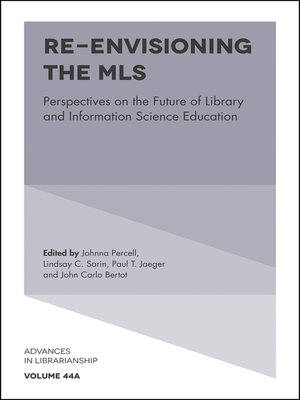Advances in Librarianship, Volume 44A
ebook ∣ Re-envisioning the MLS: Perspectives on the Future of Library and Information Science Education · Advances in Librarianship
By Johnna Percell

Sign up to save your library
With an OverDrive account, you can save your favorite libraries for at-a-glance information about availability. Find out more about OverDrive accounts.
Find this title in Libby, the library reading app by OverDrive.



Search for a digital library with this title
Title found at these libraries:
| Library Name | Distance |
|---|---|
| Loading... |
At the heart of any discussion about the future of libraries is the future of librarians—and how well our instructional programs, especially the Master of Library Science (MLS) degree, prepare them for their careers. Building on the Re-envisioning the MLS initiative from the University of Maryland's iSchool and the Information Policy & Access Center (iPAC), this book continues the critical conversations around preparing future librarians.
Library and information science (LIS) programs are the foundation of librarianship, and their design requires input from everyone in the field—from academics designing programs and courses, to practitioners reflecting on how prepared (or unprepared) they are to serve their communities, to hiring authorities considering qualifications of candidates.
The second installment of this two-part volume explores many of the challenges and opportunities inherent in the future of the MLS degree, includingthe changing nature of the communities that libraries serve and how LIS education should address these changes,
how archival training must accommodate big data,
the specialized skill sets librarians need on the job, and
how best to prepare librarians for their role as educators. These conversations will never be fully resolved, as LIS education must continue to evolve to ensure the efficacy of libraries and the librarians at the heart of the work.
Library and information science (LIS) programs are the foundation of librarianship, and their design requires input from everyone in the field—from academics designing programs and courses, to practitioners reflecting on how prepared (or unprepared) they are to serve their communities, to hiring authorities considering qualifications of candidates.
The second installment of this two-part volume explores many of the challenges and opportunities inherent in the future of the MLS degree, including







